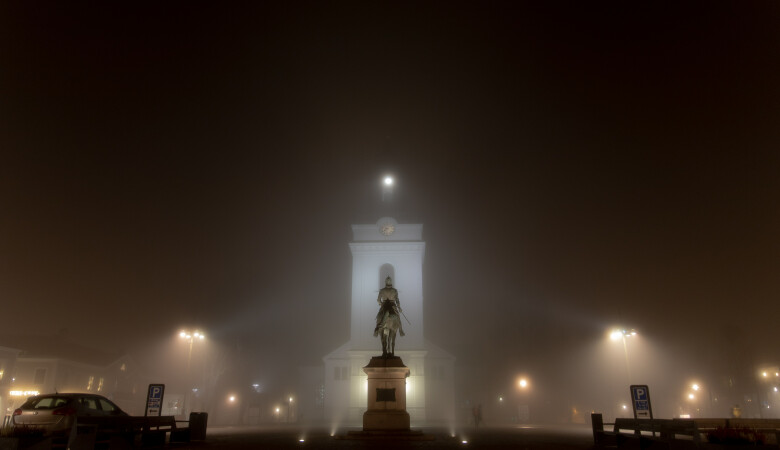Unconditional Love (Romans Sermon 29 of 120)
June 03, 2001 | Andy Davis
Romans 5:6-8
Assurance of Salvation, Love of God
I. Love Demonstrated in Laying Down One’s Life
We continue our study in Romans by looking at verses 6-8, and what someone has called the greatest description of God's love in the Bible. And I think I concur with that as we look at it. And we think about love a lot, and especially self-sacrificial love, the kind of love that costs something. A week ago we had the opportunity as a nation to think about the sacrifice of those in the military who'd sacrificed their lives. Memorial Day, originally set apart I think to honor those that died in the Civil War and then extended to other wars. And as you think about the sacrifices of those that fought and died for our nation, there are a few that stand out with incredible poignancy. And I read one earlier, this is a story of Private First Class William Baugh who won the Congressional Medal of Honor for his actions on the 29th of November 1950 in the Korean War.
This is what his citation said, it said "For conspicuous gallantry and intrepidity at the risk of his life above and beyond the call of duty while serving as a member of an anti-tank assault squad, attached to Company G during a nighttime enemy attack against a motorized column. Acting instantly when a hostile hand grenade landed in his truck as he and his squad prepared to alight and assist in the repulse of an enemy force, delivering intense automatic weapons and grenade fire. Private First Class Baugh quickly shouted a warning to the other men in the vehicle and unmindful of his personal safety, hurled himself upon the deadly missile, thereby saving his comrades from serious injury or possible death. Sustaining severe wounds from which he died a short time afterward, Private First Class Baugh by his superb courage and valiant spirit of self-sacrifice upheld the highest traditions to the United States Naval Service. He was a Marine. He gallantly gave his life for his country."
Now you've heard those kind of stories before and they cause us to pause, don't they? I mean, Jesus himself said, "Greater love hath no man than this, that he lay down his life for his friends." And that's what William Baugh did for his unit. He saw immediately that there wasn't time to get that grenade out of there and saw the only way was that he should lay down his life and he threw himself on that grenade. But it's not just soldiers like this man. My wife gave me this devotional last night, put out by LifeWay. Maybe you have read it. About a woman who was at a car race. She went to see a car race on Sunday, November 10, 1996. It says a hot rod careened out of control during a drag race and flew into the grandstand killing a woman who used her body as a shield to protect her 5-year-old son.
The boy was hospitalized in critical condition. The accident happened at a National Hot Rod Association event and it happened during a race where speeds approach 100 miles per hour. An axle broke causing the car to veer and flip over a rail and fly through a 12-foot high chain link fence. And that's when 36-year-old Vickie Lynn Foster went into action. Sheriff Joe Higgs said, "She grabbed her son when she saw at the last minute what was happening, turned her body to protect her son from the impact and the car came down and crushed her." The mother was pinned beneath the car but the son was knocked out and escaped with his life.
And then someone recently gave me a story, and I don't remember the details but I was thinking about it in the same light. It was the story of a young boy whose sister was in need of a blood transfusion in order to save her life. And they explained this to the young boy, I think he was five years old. And his lip was trembling, and he said finally he'd be willing to give his blood. So he laid down and he gave the transfusion and the sister's life was spared. But the child was crying and seemed inconsolable and his understanding was that by giving the blood he would die. And yet he gave his blood so that his sister might live.
So you have a man, you have a woman, you have a child, all of them, willing to lay down their life for a loved one.
II. The Greatest Statement of God’s Love in the Bible (verse 6)
But the love that we have described in the text today goes far beyond any of these. And this is what the apostle Paul says in Verse 6, "You see, at just the right time, when we were still powerless, Christ died for the ungodly. Very rarely will anyone die for a righteous man, though for a good man, someone might possibly dare to die. But God demonstrates his own love for us and this, while we're still sinners, Christ died for us."
You see it's one thing to give your life for someone that you love, a friend, an army buddy, even for your nation, for a spouse, for a child. There's a bond of affection there and there's something in that individual or in that country or in what it is you're trying to save that you love, and there's something in them that draws your love from you. It's somewhat of a conditional love. As you look at it, there's something that reaches out and says "This is my child. This is my father or my mother. This is my spouse or my friend. And I'm willing to lay down my life for that person."
But God's love is different than that. He doesn't look to you at all. He doesn't try to find something in you to love and then the love extends. It's not like he was searching and then found something that no one else could see and that, on the basis of that, he gave his son, not at all. And the text is going to remove forever any misconceptions to that end. God's love is utterly different from ours. It's based entirely on his own character, his own yearning to love. And in that, there is for us obviously tremendous humility, but also incredible security. We are conditional lovers, aren't we?
We see some display of that a little bit in the shifting of a wedding vow, I read this recently. In the past, you have a vow like this, "Will you take this woman to be your lawfully wedded wife, to have and to hold from this day forward, for better or worse, for richer or poorer, in sickness and health, as long as you both shall live?" But I saw in this magazine, this was a short time ago, it changed and at the end it said, "For richer, for poorer, in sickness and health, as long as you both shall love." Well, that's just one letter difference. What's the difference? Well, what it means is as long as you feel loving toward one another, you're going to keep being married, but as soon as you stop feeling that love for one another, then the thing's off.
Well, how long does that take? Probably on the honeymoon, isn't it? It's about... Things aren't quite what you thought they would be and is it at that point that the covenant is broken? As long as you both shall feel warm feelings of love and affection for one another? Absolutely not. But we are conditional lovers, and really the fact of the matter is, that that's the way we're built, it's the way we are in our sinfulness. There was a movie a while ago, I did not see it but the title intrigued me, it was a Tom Hanks movie entitled "That Thing You Do." Now, don't tell me you saw it, I don't even want to know about it because I haven't seen it.
But there's something about it, that's what draws love out, isn't it? There's something you do, that thing you do, if you keep doing it, I'll love you. As long as the circumstances are favorable, I will love you. But when things shift, when they change, I'm going to pull back my love from you. That's not God's love, is it? God is an unconditional lover, and the expression of it is here in the cross as read in verses 6-8. God's love is founded in his unchanging character. It's not dependent on us in any way, and therefore it is the only sure basis for eternal security.
Now, let's remember where we are in the chapter. Romans chapter 5 is describing to us the basis of our security, our eternal security. And God wants to put that basis on something that isn't going to move, something that is rock solid, something we can come back to again and again. And God's unconditional love is as tangible as the wood and the iron spikes that killed Jesus, that's about what Paul's getting at. There's an action in history a long time ago that demonstrates forever the love of God and nothing can remove it. It's as tangible as the blood that flowed from Jesus atoning for our sins.
And so therefore, what is God's purpose in Romans 5:1-11? His purpose is his own glory in your security. That's his purpose. He wants to glorify himself by giving you security. He wants to glorify himself by assuring you of your salvation through faith in Christ. He wants to glorify himself so that you will never be shaken again but know what it means that you are justified through faith. And so, he inspired Paul to write Romans 5:1-11. Now already, we have seen in verse 1, having been justified by faith, that's a past tense, once for all declaration in which God as the judge stands over you and says, "You are by virtue of your faith in Jesus Christ, not guilty of all your sins. You are acquitted. You're free forever from the guilt of sin." Having been justified through faith.
And then it says, "We have peace with God through our Lord Jesus Christ." What does this mean? Well, it's a new relationship. Whereas at one point, God was our enemy and we were God's enemy, that is no longer the case. We have been, another word for it will be, reconciled. We're brought into a right relationship with God. And then it says that we have an "introduction" or an "access" by faith into a new standing in grace. Remember I talked about the shower of grace? That cleansing hot shower, and we need to be under it all the time, don't we? Is there ever a moment you don't need grace? "God, turn off the grace shower for a while, I'm going to coast here in holy perfection for the next two or three days."
Is there ever a day that you don't need grace from God? Absolutely not. Love the Lord your God with all you heart, soul, mind, and strength. Love your neighbor as yourself. That kind of covers it, doesn't it? I did that today. I perfectly loved God with all of my heart, soul, mind, and strength, and I loved my neighbor as myself every moment of the day today. Is that right? Well, if the answer is no, then you need grace today. And God has given you a new standing in grace, the grace is just flowing over you all the time, that forgiveness and the love of Jesus Christ.
And then it says, "We rejoice in the hope of the glory of God." Remember I explained to you, you're rejoicing in the hope that you will be glorified by God. I think that's what that means, that someday you'll be transformed, you'll be changed forever, and you will be glorious, you'll be like God. And then it says, "We also rejoice in our sufferings." And some of you are going through testing right now, aren't you? You're going through trials, you're going through difficulties. I know who you are, some of you. Others, I don't know, you've got your own private struggles. But those tribulations, those trials are necessary for the building of your character, aren't they? Because we know that testing produces perseverance, and perseverance proven character, a tested character, that only God can work.
And so, unlike the world, we actually rejoice because of the trials because we know we need them, and that's different. And then finally, what we talked about the last time I preached, the love of God poured out into your hearts by the Holy Spirit. Remember the woosh? The fact that God can lift you up and give you such a hug that you would not believe it.
It's a supernatural assurance that comes through the Holy Spirit that you are a child of God. There's no human explanation for it. And it can reach as high as the third heaven, paradise itself, that's where Paul went to get it. Now, that's a hug from God. The assurance of God. But now, I want you to see the connection, because there's a connection between verse 5 and verse 6, and the connection the Greek could be translated "for," the NIV kind of slurs it a little bit with the, "You see." They try to be a little bit poetic there. But, there's a connection. And what is the connection? Well, this is it: Verses 6-8 are going to describe the love of God tangibly in the cross of Jesus Christ. That love, the love of Jesus Christ, the love of wood, and nails, and blood, and cries, "My God, my God, why have you forsaken me?" That love, is the love that the Holy Spirit pours out into your heart, assuring you of salvation.
It's that love. It's the same fountain, and it keeps flowing, and keeps assuring, and keeps working in your heart. That's the context. Now in verses 6-11, he's going to continue. In 6-8, we've got that positive statement of God's love, an exposition of the cross of Christ. And then in verses 9-11, he's going to draw out logical deductions. And you're going to see the words, "How much more." If God has done this, how much more will he do that? And there's going to be a logical drawing out for your assurance. If God when you were a sinner, forgave all your sins by the death of his son, how much more will he enable you to finish the race? That's where we're heading. We are not going to get there today, but that's what he's talking about.
And so basically in effect, Paul wants you to see that the journey from justification through faith in Christ alone, justification to glorification, heaven, perfection is unbreakable. And everyone who is justified through faith will most certainly be glorified. Everyone. You can't lose your justification. You're going to be glorified. And so he says it straight out. We'll get there in Romans 8:30, "Those he called, he also justified; those he justified, he also glorified." Alright, well, that's the big picture.
Now, let's get into the details, and look at Verse 6. It says there that while we were still helpless or powerless, at the right time, Christ died for the ungodly. Now, I've put in your outline there, the greatest statement of God's love in the Bible, but it's in quotations. I didn't say that. But Martyn Lloyd-Jones, one of the great preachers of the 20th century, a Welshman who was the Queen's physician, and he gave up his medical career that he might go into the ministry. Some of you who are doctors, may want to give up your medical career and go into the ministry. I don't know. Martyn Lloyd-Jones would be your pattern and your example. He said, "I do not hesitate to assert that this is one of the greatest statements of God's love in the Bible."
I'm talking about Verse 6. Verse 6. "You see, at just the right time, when we were still powerless, Christ died for the ungodly." Now, this is a central doctrine, isn't it? The love of God for us in the cross of Jesus Christ. What could be better for a preacher than to stand up and preach Jesus Christ and him crucified? We're right at the center of our faith, aren't we today? Jesus Christ and him crucified. It's a central doctrine.
The basic idea is that God the Father appeased his own wrath through the death of his son, and that this is the highest expression of his love for us. There is no higher. Now, some people see a kind of a schizophrenia in that. They say, "How can you have wrath and love in the same being? It didn't make any sense." And so they wanna get rid of the wrath, and just keep the love. That's unbiblical. We actually see the wrath of God and the love of God in the same place, the cross of Jesus Christ. And there's no schizophrenia within the Trinity. Some people do that as well. "Well, the Father is the one with the wrath, and the Son is the one with the kind love." Nothing could be further from the truth. Any wrath the Father has against evil, and against sin, and wickedness, the Son has as well. And any love the Son has, the Father has, too.
There's no division whatsoever between them. And so God, the Father is expressing his love for us in sending his Son. What does Romans 8:32 say? "He who did not spare his own Son, but gave him up for us all, how will he not also, along with him, graciously give us all things?" This is the love of the Father in the cross of Jesus Christ. And then John 3:16, "For God so loved the world, God the Father so loved the world that he gave his only begotten Son, that whoever believes in him should not perish but have eternal life."
The Meticulous Plan of God
Now as we look at this, we see the plan of God unfolding. And we see that it's been meticulously planned out. You remember the word meticulous when we were studying the Book of Daniel? Our God is a careful planner, is he not? You remember how he had measured out the days of Nebuchadnezzar's reign? Nebuchadnezzar's son and his grandson is going to be 70 years, and all of it had been measured out carefully. Well, so it is also with salvation. God had planned all of this before the foundation of the world. And we get that indication in verse 6. It says, "For at just the right time Christ died," at just the right time. So salvation had been worked out meticulously, literally before the foundation of the world. It says in Revelation 13:8 that Jesus is the lamb that was slain before the foundation of the world.
Now, he wasn't literally slain before the foundation of the world. But in the mind of God, it was as good as done. He already had worked out the salvation plan before any of us came to be, before any human being came to be. But yet, there was a perfect time for Jesus to enter the world, wasn't there? It had to be at a certain moment in history. Remember what it says in Galatians 4:4? "But when the time had fully come, God sent his Son, born of a woman, born under law…" When the time was full. The senses of a harvest time, of a fruit that ripens. Maybe some of you like green tomatoes, but I don't. I like red tomatoes. You're not going to pick a tomato when it's green. It's not ready yet. The same thing with an orange. You wait until the full ripeness comes. You can tell by the color. And when the full ripeness comes when it's just the right time, you pick the fruit. And so it is with Jesus. At just the right time, Christ entered the world. Galatians 4:4. And died. Romans 5, "at just the right time."
Now, what does he mean by the perfect time? Well, let's look at three sentences. First, in terms of human religion, it was the perfect time. Why do we say that? Because the Jews had had the law for 14 centuries, plenty of time to prove that it was impossible to save yourselves by the law, by human effort. Do you think that's enough time? Is that fair? 1400 years, and no one had managed to do it. Nobody had managed to be justified by works of the law, and so that's 1400 years to prove Paul's statement Roman 3:20, "Therefore no one will be declared righteous in his sight by observing the law, rather through the law we become conscious of sin." So that's plenty of time to prove you can't save yourselves by works of the law. You can't save yourself by doing good things, plenty of time for that.
Alright, what about in terms of human philosophy? Well, by this time, we have had the full flower of Greek philosophy. We had had Aristotle. He'd come and gone, but no salvation had been found in his system of ethics. We have had Socrates, he came and went, no salvation found there. Plato, perhaps reached the highest of any of them. He posited an unseen eternal creator being, inscrutable, invisible. But we don't know anything about him, but he did not explain could not know how to reach him. And so, the apostle Paul, when he came to Corinth and resolved, and it's hard, to know nothing except Jesus Christ and him crucified.
He said to those Corinthians, he said, "for since in the wisdom of God, the world through its wisdom did not know him." God revealed that through Jesus Christ, you see. So human wisdom was no way of salvation, neither was human righteousness or religion and neither was human government. We have had all those kingdoms. We had the Babylonian Empire, and then the Medo-Persian Empire, and the Greek Empire and then the height of it, the Roman Empire, the Pax Romana spreading over the whole Roman world. Roman government, the highest expression of human beings figuring out how to order society, and it did not bring salvation.
And at just the right time, Jesus entered the world. No salvation found, and Jesus Christ is the perfect savior. Not only was it the perfect time, but Christ is the perfect savior. Can we ever tire of saying the name of Jesus? Jesus Christ, Christ alone is salvation for the world. American Christians, sit up and listen, this is being attacked today, isn't it? Well, that's the Christian God, then you've got Buddha, he's the Buddhist God. And you've got Mohammed and Allah, that's the Islamic way to reach God. No, Christ and Christ alone is God's provision for sin and there is no other. And that message is going to get increasingly unpopular here in the US.
But Jesus Christ and him alone, he's the perfect savior, and why? Because God saw that we could not save ourselves, impossible for us to save ourselves. Isaiah 59:16 it says that God saw that there was no one. He was appalled that there was no one to intervene. So his own arm worked salvation for him and his own righteousness sustained him. God stepped in because we couldn't save ourselves. Just at the right time, we had the perfect savior. And then we have the ultimate expression of love. It says that Christ died. Notice that what Paul focuses on here is the death. He does not focus on the sinless life. He does not focus on the miracles, however amazing they are. He does not focus even on the incredible teachings, which are timeless. He focuses on the death of Jesus Christ as the expression of God's love, just as Jesus himself had taught greater love had no one than this, that he lay down his life for his friends.
III. For Whom Did Christ Die? (verses 6-8)
Now, the key here is this word "for." Christ died "for." Now, we've already talked about the death of Christ in Romans Chapter 3. Understand that it's not the life of Jesus Christ that saves you, it is his atoning death that saves you. And so, Jesus stepped in your place to pay your penalty, the death penalty for sin. Romans 6:23, you haven't got to it yet, but it says, "The wages of sin is death." There ia a death penalty to be paid for sin. All of us are sinners for all have sinned and lack the glory of God, and Jesus came to pay that death penalty. The question you have to ask yourself is, who is paying my death penalty? There's only two options in all the universe, either you will pay it eternally in hell or Jesus Christ paid it for you. And you, through faith receive that payment.
So Christ died "for." Now, who does he die for? Now, that's the interesting thing here. And it's that that separates his love from all of our love. He dies for ungodly, helpless sinners, who are enemies of God. That's who he dies for, a love utterly unlike ours. Paul talks about that in verse 7. Look what he says, "Very rarely will anyone die for a righteous man, though for a good man, someone might possibly dare to die." I don't really know if there is a difference between a righteous man and a good man. Somebody wouldn't die for a righteous man, but they would die for a good man. I don't really want to make a distinction between the two. I think it is just very rare.
That's why we write about these kind of stories, like this woman who covered her son or the private who covered the hand grenade, because these are unusual things, aren't they? Paul was right when he said, very rarely do these stories happen, that we would be willing to lay down our lives. And if you don't think that's the case, then think of this. Think of how much Simon Peter is your model, your exemplar, when he said to Jesus, the night before Jesus died, he said, even if all fall away on account of you, I never will, I'm ready to lay down my life for you. Remember how Peter said that? "I'm ready to lay down my life for you Jesus. " Jesus was a perfect man. He was more than a good or righteous man. Was Peter really willing to lay down his life that night for Jesus? No, the little slave girl at the door proved that. "You're not one of his followers, are you? " "No, not me. "
All of us have a limit to what we're willing to lay down for Jesus, don't we? That's the limit of human love, but there's no limit to God's love, the unconditional love of God, and you see it in whom he died for. Look what it says about us. First, it says in verse 6 that we were helpless. Literally, it says, without strength we're powerless. I think, for me, I get a good illustration of this from Jesus' miracles. I've noticed a common thread uniting all of Jesus' miracles, and they are human helplessness. That unites all of Jesus' miracles, except maybe the cursing of the fig tree, but I think that has roots into Israel sin. But I think as you look at the miracles, first look at, in John 9, you've got the man blind from birth. He'd never seen the light of day, didn't know the difference between red and blue. He couldn't see. Jesus healed him, so he could.
And then you've got John Chapter 5, the man paralyzed for 38 years. He's laying right by some healing waters. They believe that an angel came down and disturbed the waters, and if anyone could move themselves and get into the water first, the legend had it that they'd be healed of their affliction. This man was paralyzed. How frustrating is that? To lay there unable to move into the healing pool? He can't walk. Jesus heals him with a word, he can walk. You see? It's the same thing with the feeding of the 5000. 5000 men plus women and children, maybe 20,000 people. Jesus says to his disciples, he says that they don't need to go away, but the disciples should give them something to eat.
Feeling of powerless came over them. The crowd couldn't feed themselves either. There was no food out in that deserted area. Human inability, human powerlessness. And what did Jesus do? He fed them just like that. And then the ultimate expression, the resurrection of Lazarus from the dead. What can a dead man do? Nothing. Nothing at all. And so, we are powerless, ultimately powerless. We are dead in our transgressions and since can't move, can't do anything, can't live. Jesus just says a word and suddenly Lazarus is raised from the dead.
Look at it. Helpless to see, helpless to walk, helpless to eat, helpless to live. Does this offend your pride? I'm telling you the truth. We are helpless before God and we're certainly powerless to save ourselves. This is the constant lesson of the miracles. Humanity can't, Jesus can. And we're helpless spiritually above all. We're powerless to understand spiritual truth. It says in 1 Corinthians 2:14, "The man without the Spirit does not accept the things that come from the Spirit of God, for they are foolishness to him, and he cannot understand them, because they are spiritually discerned." You can't understand the gospel I'm speaking to you now, unless the Spirit makes it clear to you.
You can't understand it. It'd be foolishness to you. Not only that, you can't do right things, you can't serve God, you can't please him or do any good deeds that he will accept. It says in Romans 8:7-8, "The sinful mind is hostile to God. It does not submit to God's law, nor can it do so. Those controlled by the sinful nature cannot please God." That means that all our righteous acts are like filthy rags in his sight. So, there's nothing we can do about our situation. Nothing at all. Helpless or powerless.
It also says that we're ungodly, again, in verse 6. The word ungodly or wicked means totally stripped of the glory of God. We were created in the image of God, created to be like God and to love God, but that was stripped away from us through sin. Ungodly. For all have sinned and lack the glory of God. Now, to whom does this apply? It applies to everybody. We're all ungodly. Let me give you a description of someone. Suppose someone you knew led a moral life, belonged to a couple of civic groups, volunteered his time on Saturdays to raise money for worthy causes, was a member at a church, attended regularly, was active at the church and on a number of committees. Seemed like a kind and nice person, but saw no need for Christ's blood to atone for his sins. No need at all, rejected the need for atoning sacrifice, does not see God as a God of wrath or judgment, rejects that whole thing.
What does the Bible call that individual? According to this verse, ungodly. That doesn't make any sense to us. That's humbling to us. But let's be perfectly clear, there's no such thing as a naturally good person. Jesus said that. No one is good, but God alone.
IV. God Demonstrates His Love... THEN and TODAY!! (verse 8)
So, that's who Jesus died for, helpless, ungodly, and then in verse 8 it calls us sinners. "God demonstrates his own love for us in this. While we are still sinners, Christ died for us." A sinner is somebody who actively transgresses the law of God. So, he has just revealed us, hasn't he? That's who we are. And then in verse 8, it speaks of the demonstration. It says, "God demonstrates," note that tense, "God demonstrates his own love for us in this. While we are still sinners, Christ died for us." What is demonstrates? Present tense, right? That means there's an ongoing demonstration of the love of God in a past completed action, the death of Christ. You see how it works? There's a constant demonstration or display of the love of God in something that happened 2000 years ago. God demonstrates in that Christ died.
You see how it works? There's a fountain being opened up in the house of David, and from that fountain comes living water and you can drink for thousands of years from that one completed action, the death of Jesus Christ. Now, how is he presently demonstrating that? Well, he's demonstrating it now through my words, through the preaching of the gospel. And around the world in 24 time zones, people just like me are getting up and demonstrating the love of God by preaching clearly the cross of Jesus Christ, by having somebody stand up and talk about the death of the son of God on the cross for sinners. That's a demonstration of the love of God, and it's going on right now. It happens for you, any time you sit down and read the Bible and remember again what God did for you. A demonstration of the love of God directly to you.
In Galatians 3:1, Paul said, "before your very eyes, Jesus Christ was clearly portrayed as crucified." It's not because they had a drama team or something like that, or they showed the Jesus film, it's not that, it's in the clear exposition of the gospel through the preaching, through the foolishness of preaching. He talked about the death of Jesus Christ and that's why Paul said, I resolved to know nothing while I was with you except Jesus Christ and him crucified. And it was demonstrated way, way, way, back then when Jesus spread out his arms and they were nailed to the cross, he did not save himself, but he died to save you. Ongoing demonstration of the greatest love that there's ever been. A love for helpless, ungodly sinners who were God's enemies.
V. Application
Now, what kind of application do we take out of this? Well, the first I want to say to you, who don't know Jesus, who have never come him, if you're that good moral person, been trusting in your church attendance even in your baptism, trusting in your good deeds, realize none of these things save you. None. Simple faith in Jesus Christ alone saves. And I pray that any of you who have been playing that righteous game might today come to the simple cross of Jesus Christ for eternal life.
But then to those of you who have trusted in Christ, who are justified, I want to give you what this passage intends to give you, a solid foundation for your assurance. Don't look inward, God doesn't. He's not looking inside you to find something that no one else saw. He didn't look to you to love you, he looked to the cross to love you. He looked to his own character to love you and therefore it's unshakable. Don't look inward, look backward at the cross of Jesus Christ, and look upward to God who gave that gift. That's your assurance and those things will never go away.
Second of all, be honest and be assured. If you cling to the idea that I'm basically a good person, you'll have no assurance, because what guarantee is there that you will be basically a good person five years from now. But if you realize that you were in fact helpless or powerless, ungodly and a sinner when Christ died for you, then you realize that nothing can take away that love. It's an absolutely certain guarantee. Now, we are going to go next week into saying, okay, that's what you were, but now God is working in you. He's sanctifying you. He's moving you on, then it's a lesser thing for him to keep you and hold you right to the final day. That's how the logic works. But you were right at your worst when God gave his best. So be honest and be assured.
And third, survey the cross day after day. In a minute we're going to sing, "When I survey the wondrous cross." Survey it. Look at it. Think what it means. "When I survey the wondrous cross on which the Prince of Glory died, my richest gain I count but loss and pour contempt on all my pride." Do you see why he does that? Because he's a helpless, ungodly sinner who is an enemy. That's why. "Forbid it, Lord, that I should boast, save in the death of Christ my God! All the vain things that charm me most, I sacrifice them to His blood. See from His head, His hands, His feet, sorrow and love flow mingled down! Did e'er such love and sorrow meet, or thorns compose so rich a crown? Were the whole realm of nature mine, that were a present far too small. Love so amazing, so divine, demands my soul, my life, my all."
And that's brings me to my final application point. It is not in this text here, it isn't. There's nothing for you to do in this text, have you noticed that? You don't need to do anything with Romans 5:6-8 just understand and believe its message. But there are other texts, aren't there? That point back to the cross and say, if this is how God has loved us, we should in the same way love one another. Do you see that? This cross then gives a basis for us to love our neighbor as ourself. This cross, this love of God for us in Jesus Christ is the basis for us to love others. John writes us in 1 John 4:10-11, "This is love: Not that we loved God…" not that we love God, helpless, ungodly sinners who are enemies. "Not that we love God, but that he loved us and sent his Son as an atoning sacrifice for our sins."
Now, listen to verse 11, "Dear friends, since God so loved us…" by the way, "so" means, "in that way." "Since God so loved us, we also ought," [so in that way] "to love one another." But how does that work? Well, it's easy to love the lovely, isn't it? It's easy to love people that are easy to love. Jesus talked about that, didn't he? Remember he said, "I tell you: Love your enemies and pray for those who persecute you, so that you may be sons of your Father in heaven. He causes his sun to rise on the evil and the good, and sends rain on the righteous and the unrighteous."
If you love those who love you, what reward will you get? Even pagans do that. And if you greet only your brothers, what are you doing more than others? Even tax collectors do that. You must be perfect therefore as your heavenly Father is perfect. It's easy to love people who love you. But to be like God, love people who don't love you. Love people even who hate you. Love your enemies.
Now, where in the world are you going to get the strength to love your enemies? Someone once said, this is the only unique ethical idea of Christianity and it's utterly undoable. That person doesn't know Christianity. Of course, it's undoable by us, but if the Holy Spirit is in us it is possible to love the unlovely, even enemies, and love the needy, unlovely. Luke 14:12-14, Jesus said to his host, "when you give a luncheon or a dinner, do not invite your friends, your brothers, or your relatives, or your rich neighbors, if you do, they may invite you back, and so you'll be repaid. But when you give a banquet, invite the poor, the cripple, the lame, the blind, and you'll be blessed. Although they cannot repay you, you'll be repaid at the resurrection of the righteous."
Love those who can't love you back. Give to those who can't repay you in this world. And then finally, love sinning Christians. Who does that cover? I hope it covers you. Not the sinning part, the Christian part. I already know in 1st John it says, if anyone says I have no sin, I'm a liar. If I say that I'm a liar. There are going to be times that I will be utterly unlovely to you. And there will be times that you will be unlovely to me. There will be times you'll be unlovely to each other. Is that the time we say, as long as we both shall love? When we stop loving each other at those times? Not at all. That's the time that we take the love of Jesus Christ demonstrated in the cross and we love those that are difficult to love. Like speaking of myself now, I want you to understand that I'm speaking about myself, when I say like spouses.
It's important that I make that point. I'm not talking about Christi, I'm talking about myself. There are times that I'm hard to love. Husbands are supposed to love their wives as Christ loved the church and gave himself up for her. Do you see how Paul uses the cross as the foundation for a husband to love his wife? The cross is the foundation for Christians to love one another, even when it's hard to do. The cross of Jesus Christ, is the greatest display and demonstration of love ever in the universe. The love of God is most clearly seen in the cross of Jesus Christ. Come to Jesus, day after day, that you may receive what you need. Forgiveness of sins and also the ability to love those that are hard to love. Close with me in prayer, please.
Father, we thank you for this time we've had to study Romans 5:6- 8. We're staggered by it. We don't understand how you could love those who are so unlovely. And Father, all of us are like that. Father, I pray that this passage and the truths in it would slay our pride, that we'd stop holding grudges against one another and bitterness. Father, I pray instead that we would realize that you loved us when we were so unlovely and you continue to do that. I pray heavenly Father that you would send by the power of your Spirit a reviving and renewing move of love in our church, based on the cross of Jesus Christ. And Father, I pray for any that are here who have not trusted in Christ, who find the message of the cross incomprehensible or even boring. Father, I pray that you move in them and that they would in some way, come to personal faith in Christ, even today. We pray this in Jesus' name, amen.






























